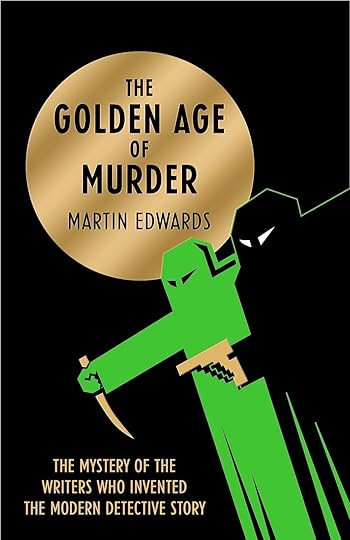Martin Edwards's Blog, page 182
April 10, 2015
Forgotten Book - A Suspension of Mercy
Patricia Highsmith's A Suspension of Mercy was first published in 1965, at a time when she was, arguably, reaching the end of her peak period as a highly original crime novelist specialising in tense stand-alones, in which it's almost impossible to predict the fate that awaits the protagonist. Later, much of her innovative work came in her short stories. But A Suspension of Mercy is a strong book, which I first enjoyed thirty years ago, and relished just as much on a second reading.
It's unusual, for Highsmith, on two counts. First, it's set in Britain - and I must say that she writes well about British life, just as she wrote well about the people and communities in a range of European countries. This novel is one that she wrote while living in Suffolk, and the setting has an authentic flavour. Second, her protagonist is a crime writer. Sydney Bartleby is a novelist who fancies himself as a TV screenwriter, working in collaboration with a friend. Some of the storylines for his scripts are hugely entertaining; I am sure Highsmith had a lot of fun coming up with the ideas.
Sydney is married to a British woman. Alicia is young and attractive, but their relationship is heading for a crisis. Sydney fantasises about killing Alicia, and starts to behave erratically. His unwisdom becomes painfully apparent when Alicia leaves home without a trace. Has he killed her? The locals start to gossip, and the police take an interest...
This is a classically suspenseful Highsmithian situation. Sydney, like so many other Highsmith protagonists, behaves self-destructively, but his folly is less irritating than that of one or two of her other characters (Walter in The Blunderer springs to mind) because of the stylish, and ironic writing. Nor is there the sense, as there is in some books, that the situation is being dragged out beyond its natural span. The last phrase in the book is "everything was a matter of attitude", and this theme is cleverly conveyed by the storyline. A Suspension of Mercy is, I think, an under-rated Highsmith, and I really enjoyed it all over again.
It's unusual, for Highsmith, on two counts. First, it's set in Britain - and I must say that she writes well about British life, just as she wrote well about the people and communities in a range of European countries. This novel is one that she wrote while living in Suffolk, and the setting has an authentic flavour. Second, her protagonist is a crime writer. Sydney Bartleby is a novelist who fancies himself as a TV screenwriter, working in collaboration with a friend. Some of the storylines for his scripts are hugely entertaining; I am sure Highsmith had a lot of fun coming up with the ideas.
Sydney is married to a British woman. Alicia is young and attractive, but their relationship is heading for a crisis. Sydney fantasises about killing Alicia, and starts to behave erratically. His unwisdom becomes painfully apparent when Alicia leaves home without a trace. Has he killed her? The locals start to gossip, and the police take an interest...
This is a classically suspenseful Highsmithian situation. Sydney, like so many other Highsmith protagonists, behaves self-destructively, but his folly is less irritating than that of one or two of her other characters (Walter in The Blunderer springs to mind) because of the stylish, and ironic writing. Nor is there the sense, as there is in some books, that the situation is being dragged out beyond its natural span. The last phrase in the book is "everything was a matter of attitude", and this theme is cleverly conveyed by the storyline. A Suspension of Mercy is, I think, an under-rated Highsmith, and I really enjoyed it all over again.
Published on April 10, 2015 04:31
April 8, 2015
The Golden Age of Murder - the first reviews

I mentioned last week the trepidation with which one awaits the first reviews of a new book. Well, I'm delighted to report that The Golden Age of Murder has got off to a grand start pre-publication, with a very gratifying "starred" review in Publishers' Weekly, and some lovely comments in Kirkus Reviews. Needless to say, I'm not above quoting some of the good bits...
“A comprehensive and well-written narrative that combines biography with literary criticism... Along the way, he dispels numerous myths about Golden Age detective fiction: for example, that it was ‘an essentially British form of escapism... an effete counterpart to the tough and realistic crime fiction produced in the United States’...The trenchant analysis is coupled with revelations about the private lives of these very public authors, offering new information for casual fans and students of the genre alike.”
Over to Kirkus, “As Edwards writes, with a suitably enticing hook, 'Why was Christie haunted by the drowning of the man who adapted her work for the stage? What convinced Sayers of the innocence of a man convicted of battering his wife to death with a poker?' Having set up a fleet of questions, Edwards proceeds to answer them with murder-laced aplomb. He has a nicely naughty sense of humor about it, too, for the well-heeled Detection Club members often poked into business that was more than a little infra dig..Yet, when the tale turns tragic—not just because of awful crimes, but also because of sad developments in the lives of Sayers and other members—Edwards writes appropriately and well."
I'm naturally very happy with these comments,. and the overarching point made by Kirkus: "Engrossing...leaves the reader wanting more." My aim has been to write a book that will do more than merely preach to the converted, and will appeal to as wide a readership as possible, sharing the pleasures of Golden Age fiction with a new group of readers as well as fellow devotees. You can't please everyone, and of course not everyone will agree with my opinions. But I'm keeping my fingers crossed for more positive reaction when the book finally appears.
Published on April 08, 2015 05:02
April 6, 2015
Dean Street Press
Last year, I was contacted by Rupert Heath, who is a well-known literary agent. His clients include such bright stars in the firmament as A.K. Benedict, a guest blogger here a while back. Rupert explained that he was setting up Dean Street Press - a new publishing company that aimed to revive a host of worthy books from the past, including some recent titles -and we have kept in touch since then. Now, I'm glad to say, Rupert's plans have come to fruition..
I'm especially pleased that DSP is making available once again the books of Tim Heald. They will be in ebook format, and this is good news for those of us who enjoyed Tim's novels about Simon Bognor when they first appeared, as well as for those yet to encounter them. It's easy to forget now, but the books were such a success that they reached the TV screens, with David Horovitch in the title role. In all, 21 episodes were screened.

By a happy coincidence, I was with Tim and his wife just over a week ago, at the CWA conference in Lincoln. The last time we met was at the most bizarre book event either he or I have ever attended - the unforgettable Kidwelly Festival - the photo was taken as we recovered over a drink, back at the hotel. Tim has not enjoyed the best of health in recent times, but I'm sure that the return of Bognor will give him a real boost. And DSP will at a later date be reissuing his Tudor Cornwall novels, and also his cricket books.
In the meantime, DSP have already brought out Stella Bingham's book Charters and Caldicott. These were the wonderful characters created for Hitchcock's The Lady Vanishes. Oddly, they didn't appear in the source novel for the film, Ethel Lina White's The Wheel Spins. The Bingham book dates back thirty years, to the time of the TV spin-off series featuring the two men.
Going further back in time, DSP have also published ebook versions of two crime novels which were put out originally under the name of George Sanders, although I understand that the ghost writers were Craig Rice and Leigh Brackett respectively.The titles are Crime on My Hands and Stranger at Home,and I'm looking forward to reading them.
The good news doesn't end there. I'm delighted to see that DSP are planning to issue several Golden Age mysteries, and although the majority of these are likely to be in ebook only format, there will also be print editions of two early novels by Ianthe Jerrold; these titles will also include intros by Curtis Evans. Jerrold, a founder member of the Detection Club, only published books sporadically throughout her long career, occasionally under the pen-name Geraldine Bridgeman, and she faded from view long, long ago. .
And there's more to come from DSP at a later date. There will be a number of books by E.R. Punshon, featuring Bobby Owen, and it will be splendid to see more of his work readily available again (Ramble House in the US have done sterling work in producing paperback editions of a few Punshon titles, but he was much more prolific than Jerrold.) Two other authors to be featured by DSP, Annie Haynes and Harriet Rutland, are even less well known than Jerrold - they weren't even particularly renowned in their day. I know little about Haynes, but Rutland was a writer who impressed Dorothy L. Sayers..
All this is a reminder that new publishing methods are unlocking a host of long-neglected crime novels. Yes, we are overwhelmed with choice, and no, we can't read every book. But it's wonderful to have the opportunity to pick out titles we like the look of - a luxury denied to previous generations where the books in question were out of print. I'll be blogging about some of the other publishing newcomers before long, but in the meantime, I am delighted by Rupert's initiative.
I'm especially pleased that DSP is making available once again the books of Tim Heald. They will be in ebook format, and this is good news for those of us who enjoyed Tim's novels about Simon Bognor when they first appeared, as well as for those yet to encounter them. It's easy to forget now, but the books were such a success that they reached the TV screens, with David Horovitch in the title role. In all, 21 episodes were screened.

By a happy coincidence, I was with Tim and his wife just over a week ago, at the CWA conference in Lincoln. The last time we met was at the most bizarre book event either he or I have ever attended - the unforgettable Kidwelly Festival - the photo was taken as we recovered over a drink, back at the hotel. Tim has not enjoyed the best of health in recent times, but I'm sure that the return of Bognor will give him a real boost. And DSP will at a later date be reissuing his Tudor Cornwall novels, and also his cricket books.
In the meantime, DSP have already brought out Stella Bingham's book Charters and Caldicott. These were the wonderful characters created for Hitchcock's The Lady Vanishes. Oddly, they didn't appear in the source novel for the film, Ethel Lina White's The Wheel Spins. The Bingham book dates back thirty years, to the time of the TV spin-off series featuring the two men.
Going further back in time, DSP have also published ebook versions of two crime novels which were put out originally under the name of George Sanders, although I understand that the ghost writers were Craig Rice and Leigh Brackett respectively.The titles are Crime on My Hands and Stranger at Home,and I'm looking forward to reading them.
The good news doesn't end there. I'm delighted to see that DSP are planning to issue several Golden Age mysteries, and although the majority of these are likely to be in ebook only format, there will also be print editions of two early novels by Ianthe Jerrold; these titles will also include intros by Curtis Evans. Jerrold, a founder member of the Detection Club, only published books sporadically throughout her long career, occasionally under the pen-name Geraldine Bridgeman, and she faded from view long, long ago. .
And there's more to come from DSP at a later date. There will be a number of books by E.R. Punshon, featuring Bobby Owen, and it will be splendid to see more of his work readily available again (Ramble House in the US have done sterling work in producing paperback editions of a few Punshon titles, but he was much more prolific than Jerrold.) Two other authors to be featured by DSP, Annie Haynes and Harriet Rutland, are even less well known than Jerrold - they weren't even particularly renowned in their day. I know little about Haynes, but Rutland was a writer who impressed Dorothy L. Sayers..
All this is a reminder that new publishing methods are unlocking a host of long-neglected crime novels. Yes, we are overwhelmed with choice, and no, we can't read every book. But it's wonderful to have the opportunity to pick out titles we like the look of - a luxury denied to previous generations where the books in question were out of print. I'll be blogging about some of the other publishing newcomers before long, but in the meantime, I am delighted by Rupert's initiative.
Published on April 06, 2015 09:49
April 3, 2015
Forgotten Book - Further Evidence
Alan Brock is a Golden Age author who has long been forgotten. I think he deserves fresh attention, and I'm delving into his life and work at the moment. My Forgotten Book today is Further Evidence, which was first published in 1934, and earned enough acclaim to be paperbacked, in the days when many good novels never made it into paper covers. Dorothy L. Sayers heaped praise on the book in a review for the Sunday Times, and that can have done it no harm at all.
Brock's specialism was real life crime. He wrote non-fiction about crime investigation, and several of his books were based on actual cases. In a prefatory note to Further Evidence, he says that the plot was influenced by more than one murder trial of the previous forty or fifty years. I'm not absolutely sure which cases he's referring to. The Crippen case is an outside possibility, but the events there were very different from those in the book.
The story, soberly told, concerns the relationship between Robert Savage and Ethel Drew. Savage is married to a nice woman, but falls for attractive, flirty Ethel. Local gossip about them provokes an incident which sees him losing his job. He ends up working for his unpleasant, sanctimonious brother, but he can't get over Ethel. The narrative is rather doom-laden, and it's clear that Something Bad is going to happen. And so it does....
I enjoyed this story. I don't claim that Brock was a masterly prose stylist, but he builds the tension pretty well, and I am certainly looking forward to reading more of his work. My main criticism of the book is the ending, which is anti-climactic, and a weak point (Sayers too had reservations about it.) According to Al Hubin's indispensable bibliography,Brock was born in 1886 and published nine crime novels under his own name, plus one as Peter Dewdney. My understanding is that he is the Alan St Hill Brock who was an expert on pyrotechnics, and a member of the Brock family famous for fireworks over many generations; their company is still going strong today..
Brock's specialism was real life crime. He wrote non-fiction about crime investigation, and several of his books were based on actual cases. In a prefatory note to Further Evidence, he says that the plot was influenced by more than one murder trial of the previous forty or fifty years. I'm not absolutely sure which cases he's referring to. The Crippen case is an outside possibility, but the events there were very different from those in the book.
The story, soberly told, concerns the relationship between Robert Savage and Ethel Drew. Savage is married to a nice woman, but falls for attractive, flirty Ethel. Local gossip about them provokes an incident which sees him losing his job. He ends up working for his unpleasant, sanctimonious brother, but he can't get over Ethel. The narrative is rather doom-laden, and it's clear that Something Bad is going to happen. And so it does....
I enjoyed this story. I don't claim that Brock was a masterly prose stylist, but he builds the tension pretty well, and I am certainly looking forward to reading more of his work. My main criticism of the book is the ending, which is anti-climactic, and a weak point (Sayers too had reservations about it.) According to Al Hubin's indispensable bibliography,Brock was born in 1886 and published nine crime novels under his own name, plus one as Peter Dewdney. My understanding is that he is the Alan St Hill Brock who was an expert on pyrotechnics, and a member of the Brock family famous for fireworks over many generations; their company is still going strong today..
Published on April 03, 2015 04:31
April 1, 2015
Len Deighton and The Golden Age of Murder

When you write a book that you care about (and why write a book that you don't care about?), it's natural to wonder about how it will be received. Because I've devoted so many years to researching as well as writing, The Golden Age of Murder, and also, if this doesn't sound too pretentious, invested a great deal of emotional energy and passion for the genre's traditions in the book, I'm probably as much on tenterhooks about its reception as I've been for any of my novels, even including the first,
I have, though, received both help and comfort from a number of wise people who read drafts of the book at different stages (and this is a book that has been much revised over the long years when it was a work-in-progress). They were all people I trusted to be supportive yet honest with me about the book, and I'll say more about their invaluable input on another occasion, but they include both fellow novelists and leading experts on Golden Age fiction. They all expressed enthusiasm for the versions they saw, and this gave me enormous encouragement.
But still, one wonders how people one doesn't know will respond! Will they be equally forbearing? This was put to the test late last year, when my publishers, Harper Collins, decided to invite a leading writer to read the book, and express an opinion. The distinguished author in question was the legendary Len Deighton, someone I once said hello to at a dinner twenty years ago, but whom otherwise I didn't know. Len has lived abroad for many years, and although I've been a fan of his books since discovering them in my teens, we had never corresponded.
To my delight, Len not only agreed to read the book, but devoured it very quickly (and it is a very long book, so this in itself was quite something!) He even supplied me with a wonderful story about his early encounters with Agatha Christie, which amused me greatly. On request, he allowed me to include it in an end note.
Len has been one of the world's most respected writers of popular fiction for decades, but he is not someone who is often quoted in relation to other books, and this makes the comments he made even more precious to me. This is what he had to say:
"You don't have to be a fan of 'whodunits' to enjoy this amazing story of their creators and their works. Here you will meet the Detection Club; a still existent and somewhat incongruous band of writers. Elected by secret ballot, their lives were seemingly stranger than fiction. I admire the way that Martin Edwards weaves the sometimes violent, sometimes unlawful, and always gripping, true stories of these writers with the equally wild tales they tell in their books.
Edwards is widely read and authoritative in his analysis. He probes the psychology of writers and dissects their plots. He provides true murder cases that inspired Christie books and Hitchcock' films. Best of all, he provides a new way of looking at old favourites. I found Martin Edwards' 'The Golden Age of Murder' illuminating and entertaining; what writer could hope for more?"
I must admit that I love that phrase "a new way of looking at old favourites". Suffice to say that Len has hit on precisely what I have tried to achieve with The Golden Age of Murder.
Published on April 01, 2015 04:52
March 30, 2015
The CWA Conference at Lincoln

Lima, Lymm, and then Lincoln in the space of 96 hours - it's all go at the moment! The reason for my trip to Lincoln this past week-end was to attend the annual CWA conference, always for me a highlight of the year. The conference is a social occasion, and a very good one, but there is also the chance to learn a good deal from the speakers, and this year Roger Forsdyke organised a very good line-up indeed. Roger is an ex-cop, and his contact book is impressive. This is the third time I've attended a conference he's arranged, and each has been excellent.
We began on Friday evening with a ghost walk around the city centre. Now Lincoln is a place with a notable history, and this was a fun way to kick off the week-end. After that, dinner, and a chance to catch up with people before the talks began on Friday. The CWA has always had a strong social dimension, and with membership on the up, there is a sense of a thriving and upbeat organisation.

The speakers included two current "cold case review" team members, senior detectives who explained how they set about solving the mystery of body parts found on the shore by the Wash. A fascinating investigation, which as the author of "cold case" books set in the Lakes, I found very thought-provoking. Then there was a chance to listen to a rather witty judge, with special expertise in criminal cases, and also a publisher specialising in ebooks. There was a book-signing at Waterstones, and a visit to a forensic lab at the university in the afternoon - or you could simply wander around the city streets in the sunshine, or take a bus tour.
The judge was the speaker at the gala dinner, and he was excellent. Sunday saw two more high quality talks, one from a detective superintendent who had solved a horrific murder case, and one from a senior figure in the CPS. And at the AGM, Len Tyler was duly elected Chair of the CWA, while the Vice Chair will be...me. All in all, a memorable week-end. Next year's conference will be in Norwich, and if you are a CWA member, it's strongly recommended.
Published on March 30, 2015 11:01
March 27, 2015
Pablo Neruda's Forgotten Books

Whilst I'm still in post-holiday mood, something rather different for today, but still (sort of) on the theme of Forgotten Books. My trip kicked off in Valparaiso, a city that reminded me slightly of Liverpool - it's a port, with tremendous character. But unlike Liverpool, it's surrounded by mountains, and a host of funicular railways (not all of them working, unfortunately) make it easier to get up and down the steep slopes. There was something cheekily Liverpudlian, I thought, about the restaurant where I had a good meal and which called itself after Emile Dubois, a murderer who somehow became a local folk hero.

One of Valparaiso's more creditable claims to fame is as the site of one of the homes of Pablo Neruda, the Nobel Prize winning poet and political activist. It's called La Sebastiana, and it's a gorgeous house, which takes full advantage of a great vantage point overlooking the Pacific from the slopes, and which boasts some fabulous architecture. Today it's one of the must-see sights in Valparaiso, and I really enjoyed my visit.

Neruda's judgment wasn't always sharp - he continued to admire Stalin long after even the likes of Victor Gollancz had come to regret their devotion to the Soviet mass-murderer. But, like a remarkable number of Communists of his generation, he was a passionate fan of detective fiction (it's a reminder, too, of the links between poetry and the classic whodunit.) Some people have even suggested that he took his pen-name, Neruda, from the surname of a famous violinist mentioned in A Study in Scarlet.

Mention of Neruda's love of "police stories" is just a throwaway line in the audio commentary about the house, but when I reached his library at the top of the building, I decided to investigate. And there I found a collection of detective fiction paperbacks written in English. They even included two of my personal favourites, Trial and Error, by Anthony Berkeley, and The Grindle Nightmare, by Q. Patrick; his editions were identical to mine. Michael Innes was one of the other Golden Age writers represented, along with such diverse names as George Baxt and Elizabeth Fenwick. In all, there weren't many books in this famous writer's home (he was one of those Communists who owned several luxurious homes, so perhaps he kept the bulk of his library elsewhere) but it was fascinating to have this glimpse of his taste in popular fiction, as well as to learn more about one of the stellar names of twentieth century literature.

Published on March 27, 2015 06:20
March 26, 2015
On the Inca Trail

One burning question prior to any holiday is - what books should I take along? In-flight movies are all very well, and I did watch four, but nothing beats a good book. I always like to take a mix of types of crime fiction, and before my trip to South America, I decided that I'd binge on Patricia Highsmith. Her books, more than most, have a cosmopolitan flavour and a strangeness that seem highly suitable for a trip to unfamiliar places (and I'm appearing on a panel at Harrogate in July which is dedicated to Highsmith, so this choice also served as good revision...)



I found myself wondering about human nature as I read her stories of bizarre relationships at the same time as exploring the history of the Incas, and their fatal encounters with a handful of ruthless Spanish colonists. The Incas were remarkable achievers, and it seems astonishing that, with numbers so heavily in their favour, their empire should have been so quickly conquered. Equally strange are the mysteries of the fate of some of the South American peoples who preceded the Incas; I had never realised until visiting museums in Cusco how sophisticated some of those peoples were.



Cusco was the old Inca capital, and today it's a marvellous city, where visitors are encouraged to consume coca tea and leaves to avert altitude sickness; there's even a quirky Coca Museum which I visited, and which gives dutiful warning about the adverse effects of cocaine addiction. Just outside the city are extensive Inca ruins at Sachsayhuaman and other sites. And I'd like to give a mention to the nice people at The Meeting Place, a cafe at San Blas run by volunteers to help and support indigenous peoples and a range of worthy local projects.


From Cusco, you can travel through the Sacred Valley of the Incas. This is a breathtaking trip, and provided the amazing experience of encountering brilliant sunshine, a complete rainbow, and thunder and lightning - at one and the same time (it has to be added that after a few minutes the sun disappeared and there was a torrential downpour, but even so, it was extraordinary.) There are more dramatic hillside ruins at Ollantaytambo. And from there you can catch the train and follow the course of the dramatic, rushing river to Machu Picchu.




Machu Picchu is one of the world's iconic tourist destinations, and for good reason. You can reach it via the Inca Trail, on which I clambered for one rather demanding afternoon, but from any angle, it's a stunning sight. I also took the time to visit the Inca Bridge - because the route is rather scary, you have to sign in and sign out; presumably they send out a search party if you don't come back. Given the vertiginous cliffs, I suspect the aim would be recovery rather than rescue. Needless to say, this was a journey which sparked thoughts about a murder mystery with a Highsmithian flavour. And I've already scribbled the first few lines of a Machu Picchu mystery - "The Two Sisters."




Published on March 26, 2015 06:58
March 25, 2015
Travel, research, reading and writing

I'm back in Britain after a holiday of a lifetime - several holidays rolled into one, really. I wanted to celebrate a variety of things, including my shift from being a (very) full-time partner in a law firm who does some writing to becoming a writer who does some legal work.In the past, I was never able to take three whole weeks off work simply to roam the world, but when the chance finally came, I grabbed it.


Ever since I was a small boy, and read Thor Heyerdahl's Aku-Aku, which I bought with a book token birthday present, I've been fascinated by Easter Island, alias Rapa Nui. I suppose it's because it's such a mysterious place, with such a strange, almost unknowable history - to this day, there's a huge amount of uncertainty about the island's past, although Heyerdahl's theories are now discounted by many people. If you like puzzles, there are plenty linked to the island's many legends. Why were the moai built, and why were they later (mostly) toppled? What was the appeal of the sinister Birdman cult? And...well, you get the picture.It's a truly unique place.


Until now, the closest I've come to Easter Island is having a small version of one of those extraordinary moai in my rock garden, but at last I've fulfilled my ambition to visit this remarkably remote tropical paradise. And given that it's so far away, I contrived while I was out there to fit in trips to some other wonderful places in South America, a continent I've never visited before. More about mainland Chile, and Peru, tomorrow..


I've never mastered the art of writing while travelling, partly because I'm not a keen laptop user. But travel does offer a writer the opportunity to research, to read, and above all to think and imagine. Getting away from it all is good for the creative instinct, and that was certainly my experience on a tour which involved eleven flights, two rail journeys, and countless trips on bumpy roads by bus or taxi. I am certainly not a hardy or intrepid traveller, and no jungle trekking or camping was involved, but even so, by my standards, it was a truly epic trip.

 I did make a very conscious effort to talk to those I met along the way, sometimes in quite a lot of depth, and this was in itself a kind of research, as I learned a good deal from some very interesting people. They included Paolo, of the Hotel Gomero on Rapa Nui, and Fritz, an Austrian professor and seasoned traveller, among others. And while my prime literary aim was to think out my next novel, I found myself digressing, as one extraordinary place after another suggested ideas for stories. Will they all get written? Not sure, but some at least will eventually see the light of day, because the memories I've brought back home with me are so vivid that I'm confident they'll prove as enduring as the mysteries of Easter Island..
I did make a very conscious effort to talk to those I met along the way, sometimes in quite a lot of depth, and this was in itself a kind of research, as I learned a good deal from some very interesting people. They included Paolo, of the Hotel Gomero on Rapa Nui, and Fritz, an Austrian professor and seasoned traveller, among others. And while my prime literary aim was to think out my next novel, I found myself digressing, as one extraordinary place after another suggested ideas for stories. Will they all get written? Not sure, but some at least will eventually see the light of day, because the memories I've brought back home with me are so vivid that I'm confident they'll prove as enduring as the mysteries of Easter Island.. 



Published on March 25, 2015 10:21
March 23, 2015
Her, by Harriet Lane - book review
Her,by Harriet Lane, is a very good psychological suspense novel, and although I think it is flawed, I found it intensely readable. In particular, the quality of the writing is striking. I've read a few good psychological thrillers lately,but this is possibly the most elegant in literary terms. It's in the vein of Gone Girl, in the sense that the story is told from two contrasting viewpoints. In Her, though, both the narrators are female.
Nina is a wealthy woman, who seems to have it all. She lives in north London with her second husband, and her daughter from her first marriage, and pursues a successful career as an artist. However, one day she spots a woman she recognises from her past, someone who harmed her in some unexplained way. Soon, Nina is stalking her.
The other woman is Emma. She is much the same age, but has far less money. She has a small boy, and during the course of the story, she gives birth to a baby girl. She does not recognise Nina, and when Nina befriends her, she is almost pathetically grateful. Nina starts to do unpleasant things (even briefly abducting Emma's son) but Emma suspects nothing. The tension mounts, as we wonder what Nina is going to do next....
Two questions tantalise the reader. What did Emma do that was so awful? And given that Nina appears hell-bent on taking revenge, what form will it take? Unfortunately, in this review, I don't think it would be right for me to discuss what happens. I must say, though, that while I felt that one of the plot strands was strong, the other ultimately disappointed me. I sense that Harriet Lane was trying to do something ambitious and unexpected by making a sort of virtue of anti-climax. A bold plan, and for me, it didn't really work. This didn't ruin the book for me, though.. (Be careful if you check out Amazon reviews, because some people who felt the same as me have discussed the story's ending in detail.) One other cavil is that the voices of the two women are perhaps not sufficiently differentiated.
I'm tempted to read the book again at a later date, knowing how it ends, and understanding better what the author was trying to do. And it may be that I'll feel differently about the climax the second time around.
Nina is a wealthy woman, who seems to have it all. She lives in north London with her second husband, and her daughter from her first marriage, and pursues a successful career as an artist. However, one day she spots a woman she recognises from her past, someone who harmed her in some unexplained way. Soon, Nina is stalking her.
The other woman is Emma. She is much the same age, but has far less money. She has a small boy, and during the course of the story, she gives birth to a baby girl. She does not recognise Nina, and when Nina befriends her, she is almost pathetically grateful. Nina starts to do unpleasant things (even briefly abducting Emma's son) but Emma suspects nothing. The tension mounts, as we wonder what Nina is going to do next....
Two questions tantalise the reader. What did Emma do that was so awful? And given that Nina appears hell-bent on taking revenge, what form will it take? Unfortunately, in this review, I don't think it would be right for me to discuss what happens. I must say, though, that while I felt that one of the plot strands was strong, the other ultimately disappointed me. I sense that Harriet Lane was trying to do something ambitious and unexpected by making a sort of virtue of anti-climax. A bold plan, and for me, it didn't really work. This didn't ruin the book for me, though.. (Be careful if you check out Amazon reviews, because some people who felt the same as me have discussed the story's ending in detail.) One other cavil is that the voices of the two women are perhaps not sufficiently differentiated.
I'm tempted to read the book again at a later date, knowing how it ends, and understanding better what the author was trying to do. And it may be that I'll feel differently about the climax the second time around.
Published on March 23, 2015 01:00



